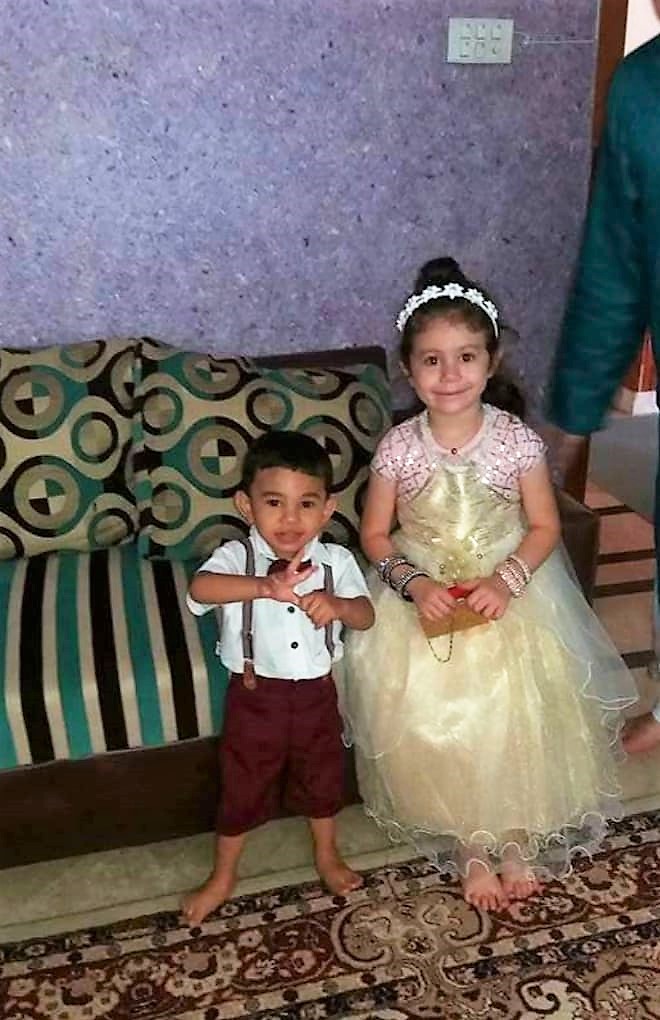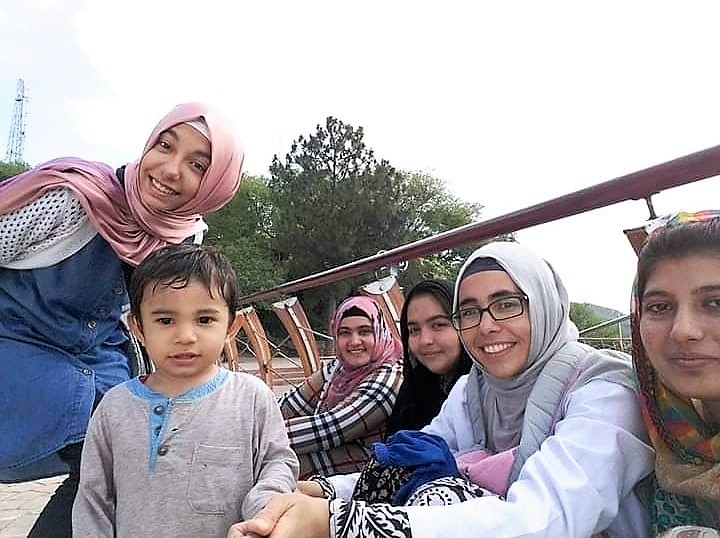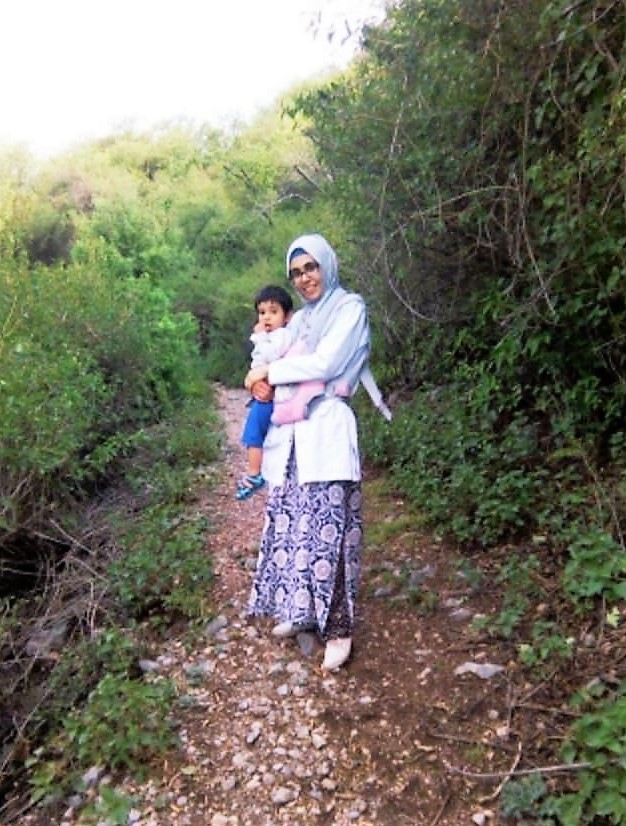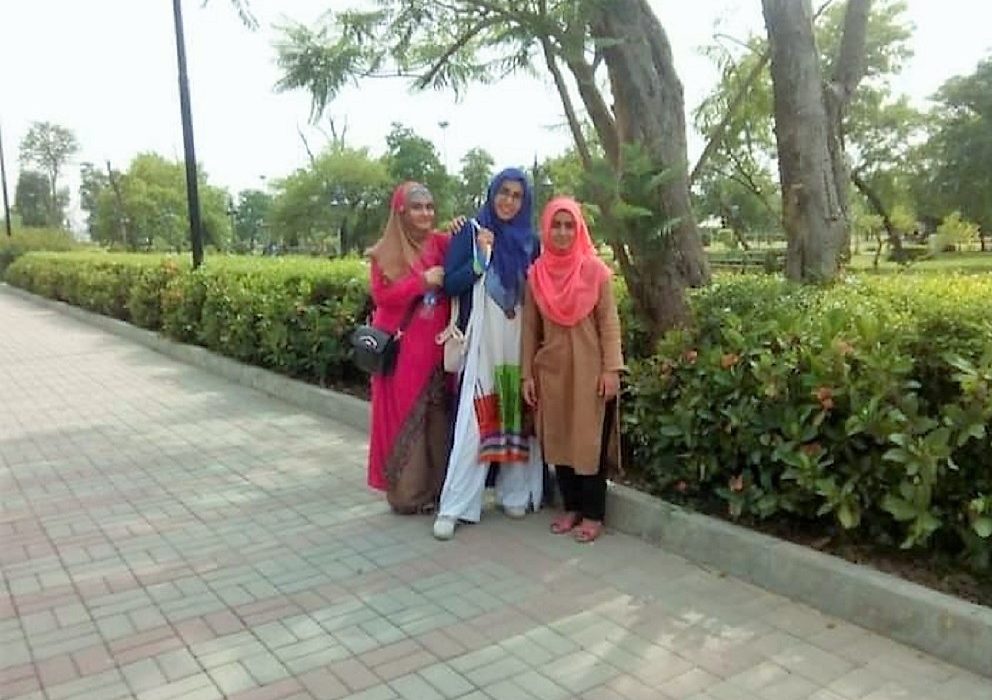English teacher Fatma Öksüzer (1): I wished to teach to those children I watched at the Turkish Olympiads

The Three Days of Life (Poem)
August 5, 2021
‘World’s beauty’ Islamabad turns 61
August 8, 2021Fatma Öksüzer was an idealistic teacher who had just graduated from the university. While she could opt to practise her profession comfortably in her own country, she preferred to follow her dreams, even if it meant to take a path of hardship. The first sojourn in her overseas journey for which she had set off by saying, “I’ll go anywhere!” was Afghanistan. She experienced the first thrill of teaching there and met her first students, whom she would never forget. She also started a family there and had two children.
And one day, when it was said there was a need, she and her family set off to the neighbouring country Pakistan without hesitation. Yet, life has always been full of surprises and ordeals. The world has been such a place where things do not always develop as we expect. Due to the illness of their new-born baby, she and her husband had to wait for a year in their hometown where they had been for vacation. The story began to be written a year after the Pakistan page had been opened.
Fatma Öksüzer told this story, which expanded from Manisa to Afghanistan and Pakistan, and nowadays continues in an African country.
Could you briefly describe your life before going to Pakistan?
I was born in 1985 in Manisa. I attended the secondary school at the Saruhanli Anatolian High School. In 2000, I started the Manisa Teacher High School. It was a popular school with high-achieving students. I always wanted to go to that school because I wished to have teaching as a career. Afterwards, I qualified in the university selection and placement examination to be placed in the English Language Teaching undergraduate degree program at the Canakkale Onsekiz Mart University. I attended that institution for five years. After graduation, I wished to go abroad. I didn’t know what my family would say about that. We are three siblings. My parents were farmers in our village, but placed great importance on our education. They spent all of their assets for us. They might not let me go abroad.
Teaching English is a sought-after profession in Turkey. You could have easily practised your profession there. How did your ambition to teach abroad emerge?
I used to watch the Turkish Olympiads attended by the students from various Turkish schools worldwide. The more I saw those children, the more I wished to go abroad. A Vietnamese student recited the Turkish poem “Ihlamurlar Çiçek Açtığı Zaman” (When the Linden Trees Bloom) and I was amazed. Even though my major was not Turkish, I wished to go abroad and teach to those children. Whenever I used to visit home for the holidays, I used to tell my parents jokingly, “I’m going to go to Vietnam!” I was actually preparing them psychologically without even realizing it.
In February 2008, the academic year when I was about to graduate, I attended international education seminars in Istanbul. Those seminars proved one of the most exquisite experiences of my life, both materially and spiritually. Those two weeks were chock-full with activities. Teachers working abroad would come to lecture us. My family too knew that I was on a path then. It was just not clear where I would go or when I would go. I attended a seminar in the summer. I was not sure if my family would agree anyway. In my circle, there was only a few who chose to work abroad or out of the city.
After the summer seminar, career interviews were held. I said to the interviewer, “I’ll go anywhere!” When he asked me again, “Would you still wish to go abroad even if it was Iraq or Afghanistan?” I replied in full confidence and with a heroic tone, “I’ll go, of course!” 😊
EVERYONE WAS SAD AS I WAS LEAVING
After the interview, I was also worried. “I will go, but will my family allow me?” I said to myself. I thought about how to persuade them. Later, I was told that I might go to Afghanistan. Until then, I kept telling my family, “I have to go abroad to improve my English.” That was my true intention, but how was I going to improve my English in Afghanistan? I didn’t know how to explain that. I didn’t know how my mother would react, either. I was afraid she would protest, but when I phoned and explained, my mother’s first sentence was “What do you have to take with you there?” I was very happy to hear that. Afghanistan was known as a dangerous place. We used to read the news of the exploding bombs there. It would be very testing for families to send their single girl there. Yet, by Allah Almighty’s grace, they consented for that.
Leaving must have not been easy, for sure. What did you experience during that phase?
After the seminar, I went to my family home. I had to leave after a month. On August 8, 2008, I boarded a connecting flight to Afghanistan from Istanbul to Ankara. I have a photo with my family at the Manisa Inter-City Bus Terminal. All my family and relatives were there to see me off. Everyone was sad, I was the only one smiling. Means of communication were limited; online video chat or similar other technologies were not so advanced. My parents were sending their daughters to an unknown place. Years later, when I saw that photo again, I acknowledged better how my mother had felt that day. Just because she trusted me, she let me go while shedding tears inside. There were five teachers and five mentors in our travel group. Afghanistan was always described with its beautiful aspects. We set off gleefully. It felt like we had known each other for years, even though we had only just met at the airport. We boarded the plane from Istanbul, but we were told during the stopover in Ankara that the aircraft had developed a fault. We stayed in a guesthouse for two days in Ankara. My mother called me and I picked up the phone. She thought I had reached my destination. She was surprised when I answered the phone. I explained the situation. My whole family once again said “You can still give up. You can still return!” but there was no way back on that path anymore.
We would like to include more of your Pakistani memories here, but still, could you briefly describe your experiences in Afghanistan?

We landed in Afghanistan on August 11, 2008. I had asked nothing about the country when I set out. I did not know whether there was electricity or water or if I would have a place to stay. I knew nothing, just knowing that our school and students existed was enough. There was need for a teacher and I was going there. That was it. I had reset my expectations.
It was my first time abroad. Everything was different. I loved Afghanistan so much that in a week, “I belong here” I said to myself adding, “I have found my place. I will be here from this time on.” I taught at Kabul Girls’ High School. The students loved us much. I have never felt so loved in my life. I didn’t have free time. My days and nights were dedicated to the students. Guidance and counselling activities were very intense. I learned Dari in six months. Power outages were frequent. We used to listen to the radio on our mobile phones. There was no Internet network. I worked in Kabul for nine months. Later, I worked at the newly opened girls’ school in Herat, a city close to the Iranian border. I went there with the founding principal and one mentor. Being the first teacher of a school was also unique. Later, I got married. My husband is also from Manisa and he is a Maths teacher. My daughter Bahar was born in 2011 and my son Sami was born in 2014. Around the same time, we were posted to Pakistan. We sold our household stuff. We vacated our house and went on summer vacation to Turkey when my son was only 20 days old. After visiting our families, we would go directly to Pakistan. We had shipped our four or five suitcases to the school in Pakistan by truck because the two countries shared border. The Pakistan chapter opened in our lives then.
WE LEARNED AT THE HOSPITAL THAT OUR BABY HAD BRAIN HAEMORRHAGE
You talk as if it didn’t happen the way you had planned. The Pakistan page was opened, but it seems you took more time to write in it…
Yes unfortunately. We were staying with my parents as a family. Those were the days we had just arrived in Turkey for our vacation. One day my baby got sick and we went to the hospital. We thought it was nothing serious, but the tests revealed that he had cerebral haemorrhage with life-threatening cracks developed in his skull. He was admitted to the intensive care unit of the university hospital. I and my son stayed in the hospital for an entire month. Even when he was discharged, we left the hospital on the condition of taking him for a check-up every week. Ten days after leaving the hospital, he fell off the sofa at home. We rushed to the emergency room. The brain haemorrhage had recurred and they restarted his treatment. The doctors told us, “Do not take the child elsewhere.” He would have regular check-ups for an entire year. My husband had left us back in Turkey around September and gone to Pakistan. Understandably, he had to go for his professional commitments, but I felt fallen apart. When we could not go to Pakistan, my husband took leave and came to Turkey.
The hardships we experienced during that period changed me a lot. Normally, I am a cheerful person, but Fatma who had gone to Afghanistan and got used to there within a week differed greatly from Fatma who went to Pakistan. One realizes that anything can happen at any moment in life. Everything might not go well. It was an unexpected and distinctive test for us. There was both the sadness of not going to Pakistan and the heartbreak due to my son’s illness. We are from Manisa, but I do not belong there anymore. Having been abroad for years, Manisa felt like a foreign country since long. It no longer felt like homeland. This is a very unusual feeling. It is not my own house, not my own stuff.
My husband taught in a private college. I started six months later. Our families said to us “Don’t go anymore; your child is sick. Find jobs here, set up your house and stay here.” Before we could reply, my daughter, 4 years old then, used to say, “No, we will go. This is not our home. We’ll get on the plane and go to our distant home.” We knew we wouldn’t be able to go to Pakistan if we bought new furniture and set up a house. That’s why we never agreed to it. We did not want the door to overseas service to be closed for us. We went to Pakistan in July 2015.
You wouldn’t have gone abroad if you didn’t want to, right? What motivated you for that decision?
We never thought of not going. We would go. Our life and our service commitment were there. We couldn’t think of any other possibility. However, my husband and I had both worked at a private college in Manisa. Yet, it was always meant to be a temporary commitment for us. Every time we said, “We’re going to leave here. We will not be here in the summer. We came from Afghanistan and we will go to Pakistan.” This was always been our talk. We always wished to go soon, thinking our child was then one year old and that he had recovered. We explored whether he could be treated in Pakistan if he became ill again. My son could not walk or talk. We didn’t know how his development would go. Our minds were constantly busy with the questions on whether he could walk, talk and have a normal life.
WE ALMOST DIED WHENEVER LIGHTS WENT DOWN, YET LIFE WENT ON!
Fatma, who had gone to Afghanistan, was a single, idealistic, courageous, and active teacher. The one who went to Pakistan was then a mother of two young children. I was on the road in a state of exhaustion and low positive outlook. Nowadays I realize the things. I used to pretend as if nothing was wrong; yet something was. Saying goodbye to my family was sadder that time. They were more upset. They were seeing us off with an unwell child.

Where did you settle in Pakistan? How were your first impressions?
First, we landed at the Islamabad Airport. I had the same experience told by everyone. A damp oven heat hit my face in the midnight. It smelled like a spicy dish cooking right next door. That became the defining aromata of the country. We asked the school manager who picked us up, “Do you sense the smell in the air?” He replied, “We do not sense it anymore. We are used to it.” It was a very different situation.
Before we left, we had rented the house of a colleague, who had left the country, without even seeing it. It was also close to the school. We went straight to that house at night. Since a Turkish family had vacated that place, I expected it to be like a Turkish house. It was a very large house. It received sunlight from three sides. When I considered it with common Turkish logic at first, I thought “Oh! How nice! It has lots of windows” but the heat did not give us any respite. Yet, the sun-drenched houses were not so popular. People generally preferred the basements because they were warm in winters and cool in summers. Our house was on the top floor, getting sun from all sides. It was a large house but you could not wish to leave the rooms where the ceiling fans were running.
Since the electricity was cut off regularly, everyone had a battery backup system called UPS (uninterrupted power supply) in their homes. When the power was cut off, that system was activated and the fans continued to whirl, because it was impossible to live without the cooling of a fan. Our colleague, who had vacated our house, had medical condition and he used to feel cold on his head. That was why they had not installed a UPS in the house. We had just arrived in Pakistan and we had seen no one house yet. We had not talked to anyone, either. Therefore, we did not know there should be such a backup system at home for our comfort. We tried to live without fans whenever the electricity went out. When the night fell, we sat in the dark or went to bed early. A few weeks later, we invited the school principal to our house. When the electricity went out, he asked, “Don’t you have a UPS?” We asked, “What is that?” The next day, that backup system was installed at our house immediately. What a relief it was! Whenever the lights went down, we almost died; but life went on elsewhere. 😊
My daughter was 4 years old when we first went to Pakistan. The child who said for an entire year in Manisa, “We will go to Pakistan, that is our home,” was so overwhelmed by the heat, so she said, “I wouldn’t have come if I knew it was this hot.”
How did you feel when you lived in Pakistan after Afghanistan? Was there anything you missed or had difficulty with?
Although they looked similar from outside, the cultures of the two countries were different. In Afghanistan, Dari is spoken. Urdu is spoken in Pakistan. Dari was a language I loved and could speak. However, Urdu was not like that. I could not understand the street talk and I could chat with people. I missed Afghanistan. It felt like I was missing my homeland. We went to a famous market in Islamabad with a friend. He was shopping and chatting with people, and we were dumbfounded next to him. Later, we saw an Afghan vendor. I talked to him, but then I turned my back and wept. It felt like I had seen someone from my homeland. While I only asked him something like, “How much is this?” and did not have a long chat, even that much was enough to make me cry.
MY SON STOPPED TALKING TO THE BABYSITTERS
After Afghanistan, Islamabad felt like a paradise to us. It was a very green, very beautiful, clean, and well-built city. We had not seen greenery in Afghanistan for years. It is a geography dominated by the colour brown. We were very happy to be in Islamabad. There were luxury shopping malls, stores and restaurants in Pakistan that Afghanistan did not have. There were Christians and Hindus among the population, but not in large numbers. People did not want to disclose themselves too much.
When I taught, I used to leave my daughter to the nursery and my son to the babysitter’s room. My daughter did not want to go to school because she did not know the local language. She had learned Dari, but she had a hard time because English or Urdu was spoken at her school. I thought the babysitters in the nursery spoke English or Urdu and my son would learn from them too. He stopped talking with the babysitters. Each babysitter spoke her own local language. My son stopped talking completely because he understood none. He was confused. There were 14 local languages there. Over time, even though he did not speak, he understood Urdu.
Where did you teach? Did you find it difficult to communicate with students and parents?
Three days after I arrived in Pakistan, I worked at the Islamabad Girls’ High School. I attended the group meeting when I arrived there. I was the only English teacher from Turkey. I had a hard time understanding even English because the accent there was distinctive. I faced considerable difficulty. Later, I got used to it. Now wherever I see a Pakistani, I feel like I’ve seen someone from my hometown. I even love the cadenced accent.
Pakistan is a place where the English and the British culture are visible. Some snubbed those who were not fluent in English. Students at the school spoke and wrote well in English, and they expected the same from the teachers. I taught to grade 7. My students used to say, “We learned grammar from you by having fun”. There were numerous modest students. You could also see you were loved if you loved them. We used to organize reading retreats with students. I was novice to the system since I was new to Pakistan. I tried to know the students and parents.

They supported us and showed us their love, especially during the hard times we experienced in the last phase. They visited our house and brought us food and fruits. Some even wanted to assist us financially. In Pakistan, I taught for a year at the school and sat for a year at home away from school. Even though they did not know me well, the students treated me with love, respect and affection. I’m still in contact with some.
Could you talk about the reflections and effects of the social, cultural and spiritual activities you did with the students?
I could only teach for one year in Pakistan. I was just getting to know my students. There is one thing I cannot forget. We used to go on hiking with the students during camping times. There were mountain hiking trails in Islamabad. We had to leave early in the morning. Once, since we did not know, we chose the steepest of the five hiking paths. I went there for the first time in my life. While it was difficult to climb there alone, I had a baby close to two years old in my arms. My daughter was also with me. Aspired by the activities we would do with the students; I braced all difficulties for their happiness. However, the students helped and we climbed together. Extracurricular activities were very beneficial to get to know the students and their families. Since I could not arrange a babysitter, I had to take my children with me. It was also a special memory for me. Maybe it would have been all right if I hadn’t gone on hiking under those circumstances, but I went so as not to offend my students.
STUDENTS LINED UP TO WELCOME US TO THEIR HOMES
Once, while returning from hiking, I had my son with me. With the students, we were caught in a rain that fell like a flood. You get to know people in difficult times. You see who complains, who endures and who keeps her spirits high. It was an experience for me. It was beautiful that day too. Islamabad was beautiful both with its nature and with its students.
In the months when I was just starting, I invited the students to the house. I used to prepare them treats. They rejoiced in even the simplest things. I used to leave the kitchen to them to make them feel at home. They used to prepare tea with milk for themselves. I used to say to them, “You prepare it and let me learn it too.” I used to take my children to home visits, thinking seeing them would make parents feel more at ease.
As a teacher, I was focused not only on my students’ academic development but also their spiritual and moral development, and I was happy to do that. That was our teaching approach. We were following students’ development meant for this world and the next. We assumed this as a sublime responsibility. Parents valued it more when we visited them at their homes. Those who were not used to this might say, “What’s the need for a parent visit?” but when they realized its essence, parents would invite us themselves. Children would line up to invite us to their homes. Since the parents knew we could not eat spicy food, they used to prepare the treats as spice-free as possible. It was too kind of them to even think about this. It seems normal because everyone there acts like that, but it’s a praiseworthy courtesy. Such treatment made us feel so good. I wish I could teach again, attend to my students, and visit parents… ☹
To be continued…





No Comment.